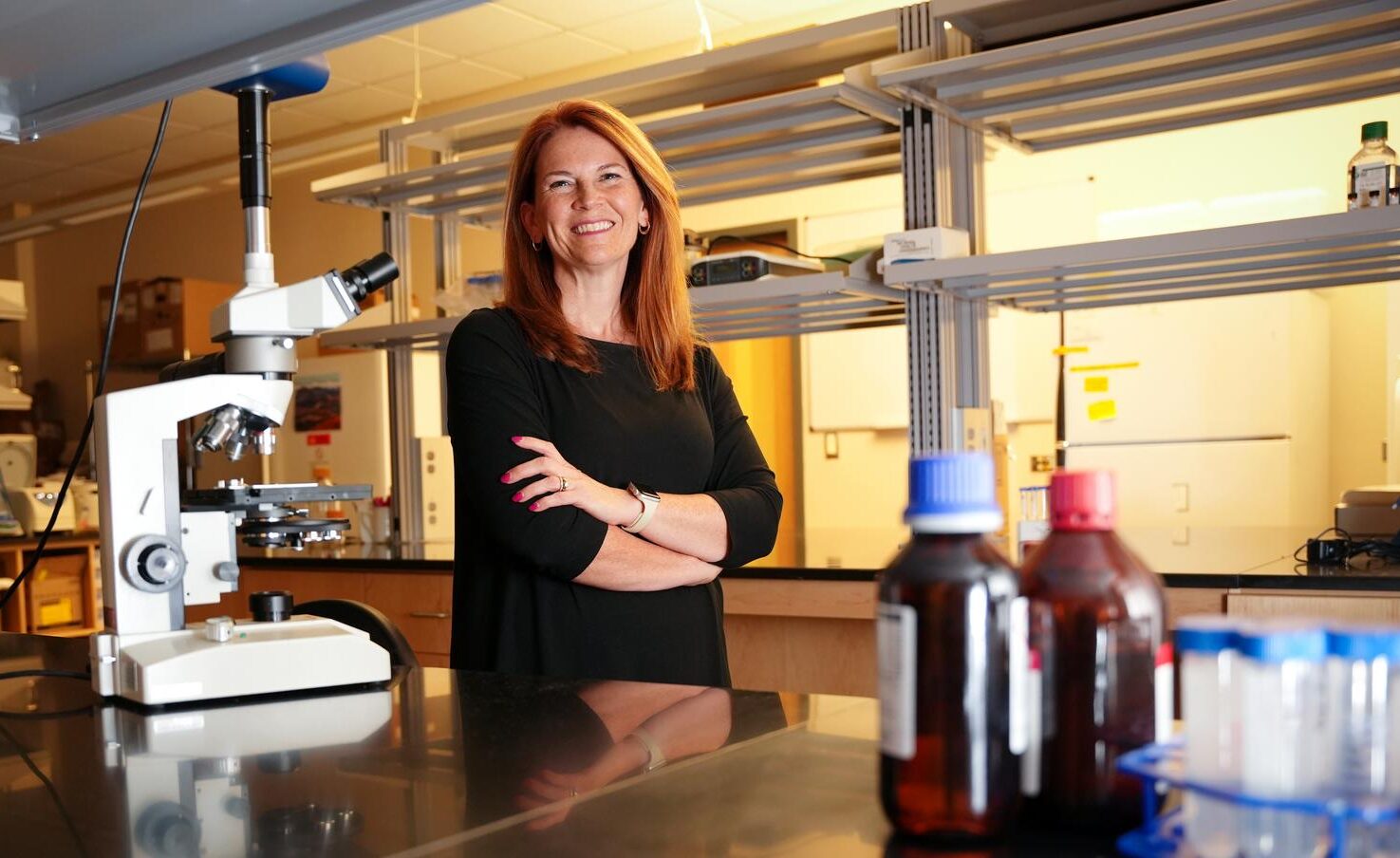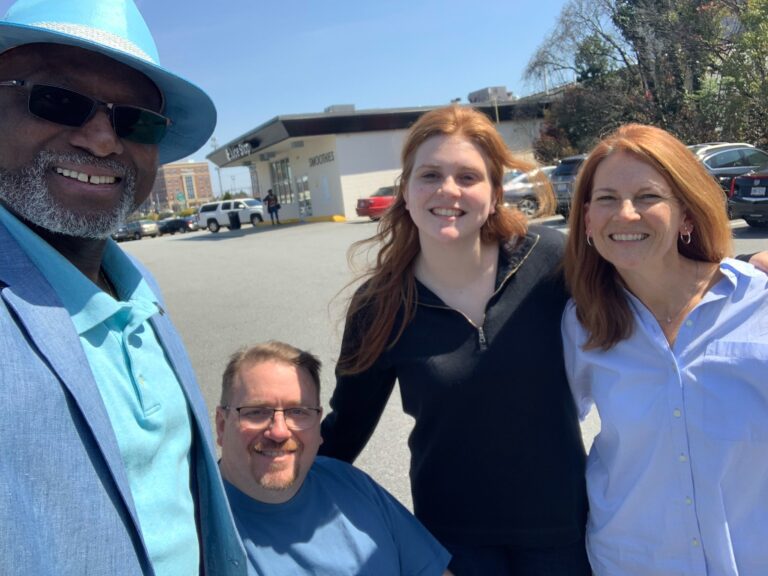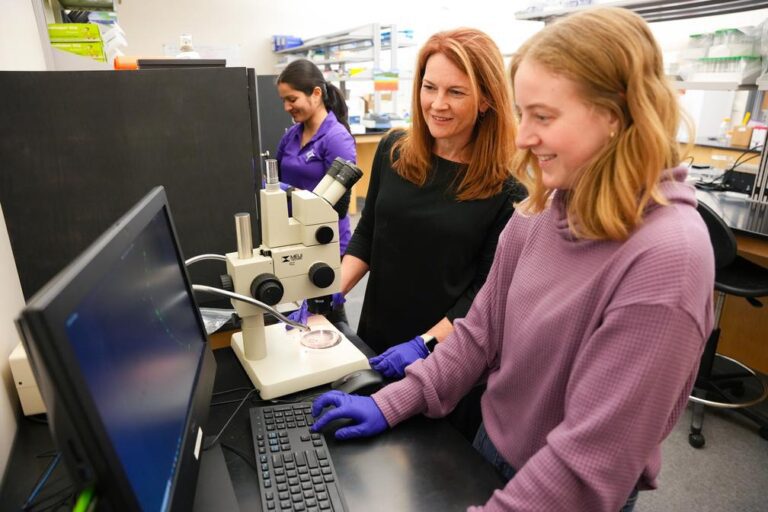Women’s History Month: Professor Victoria Turgeon discusses women in STEM

Women’s History Month at Furman
Read more stories >>
For Women’s History Month, we asked a few Furman University faculty members to tell us about challenges and progress in their careers, and what they think is necessary to bring us closer to equity.
Victoria Turgeon, professor of biology, academic director of Prisma Health Partnership and faculty ombuds, received her bachelor’s degree from Randolph-Macon Woman’s College and her doctoral degree in neurobiology and anatomy from Wake Forest. She joined Furman’s faculty in 1998. Among her honors are the Henry and Ellen Townes Associate Professorship of Biology, the Howard Hughes Medical Institute Distinguished Mentor Award and the Alester G. Furman, Jr. and Janie Earle Furman Meritorious Teaching Award. She is part of a federal grant to address issues faced by women in STEM fields.
Q: Describe the state of women in your field when you started, and today.

Lucien Houenou, Victoria Turgeon’s thesis advisor; her husband, Chris Turgeon; daughter, Emma Turgeon; and Turgeon, in 2023.
VT: When I entered graduate school in the biomedical sciences (neurobiology & anatomy ), there were just as many women as men seeking their PhDs. However, this was not the case for the professors and researchers who were teaching and training us. Out of the 20 or so faculty in my area, there were only two women, and the second woman didn’t arrive until half-way through my graduate training. My friends at similar institutions had the same experience. There were plenty of women graduate students, but few mentors who had the same lived experiences. Today, women and men continue to enter STEM graduate programs at the same rates, albeit there are some differences across the sub-disciplines, but there are now more women holding PhDs teaching and training graduate students. While there are more women researchers and faculty, there is still a significant difference in the number of women who advance all the way to being full professors that is not explained by the sheer number of women who enter these careers. Academia and research institutions have made remarkable strides providing resources for junior colleagues to attain tenure and associate professor status, but resources to support advancement to full professor and leadership are still lacking.
Q: What’s been the most significant development for progress for women in your field?
VT: There have been many developments that have positively impacted women’s advancement in STEM, but I think one of the most significant has been FMLA practices that ensure that the law is not being abused. In the early years when men were taking FMLA after a child’s birth or adoption there were reports of men taking FMLA to reduce their teaching obligations only to hire sitters and advance their research. This created an unfair advantage for women who took FMLA to recover from childbirth compared to men who took FMLA to further their research agendas. Most research and academic institutions restrict employees from working on the employer grounds during leave; however, there are exceptions that then create inequities.
Q: Who has inspired you?
VT: My dissertation advisor, Lucien Houenou, PhD, continues to be a great inspiration to me. Throughout graduate school when my peers were being molded into cookie-cutter images of their mentors, Lucien cared about what I wanted to do with my PhD. He did not look down on my goal to join a PUI (predominantly undergraduate institution). Instead, he supported me and encouraged me to take advantage of every teaching opportunity that was offered to me. He also modeled joy in everything he did and stressed the importance of connecting with people. To this day, I stay in touch with him, and I strive to achieve work-life flow.

Victoria Turgeon, middle, professor of biology, works with Isabel Greco ’25, right, and Biruja Dahal ’24 in a research lab in Plyler Hall on March 18, 2024.
Q: What’s the biggest challenge for women today, in your field or in general?
VT: I think the biggest challenge for all people is thinking that we should work, lead and/or conform to certain standards. People in “higher” positions have set the bar for what is acceptable to wear, what questions can be asked and who can even talk to particular individuals within an organization. Women (or anyone who is at the fringe) are constantly checking how they show up in a space hoping that they will fit-in and be taken seriously. Constantly conforming provides no space to evolve thought and process.
Q: What one thing needs to happen for women’s progress to continue?
VT: Any group of people who feel stunted in their progression should not accept the status quo. Organizations need to continue supporting education about microaggression, and championing DEI initiatives. However, they need to go beyond just education and put systems in place that remove those who are committing the aggression. Too often, the person who has been stifled in their work, made to feel “less than,” or has been the target is the one who finds a way to cope, or they leave.